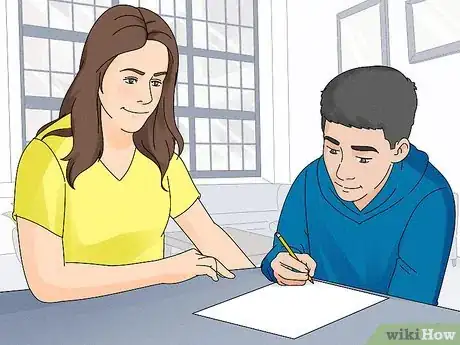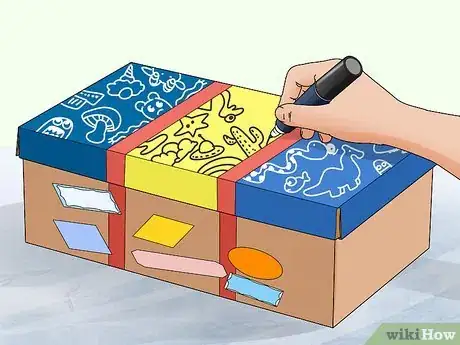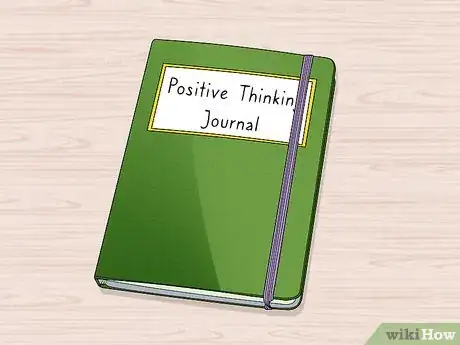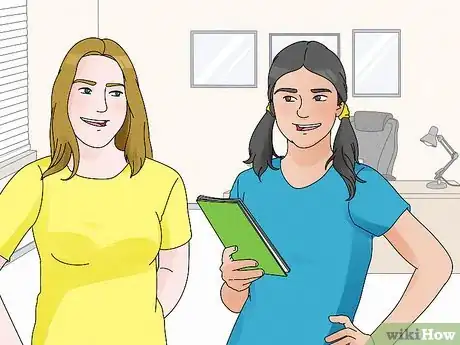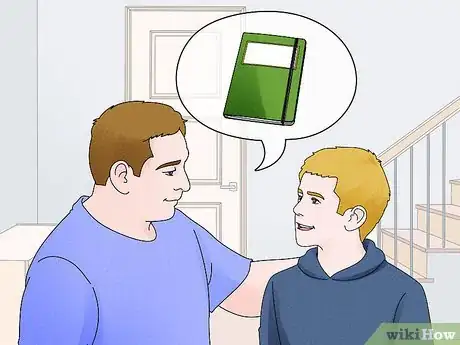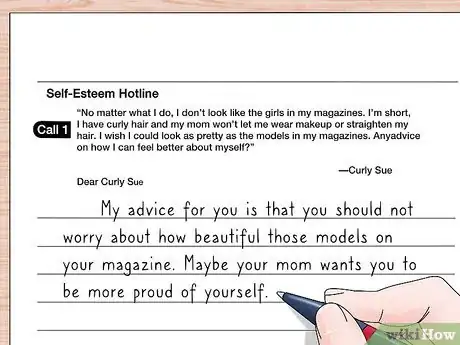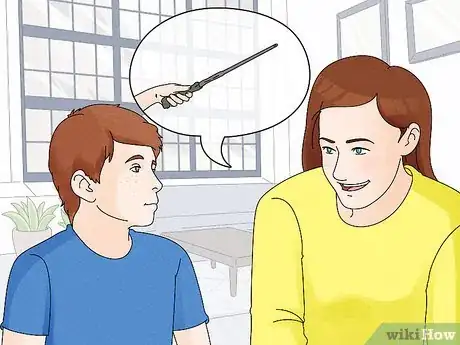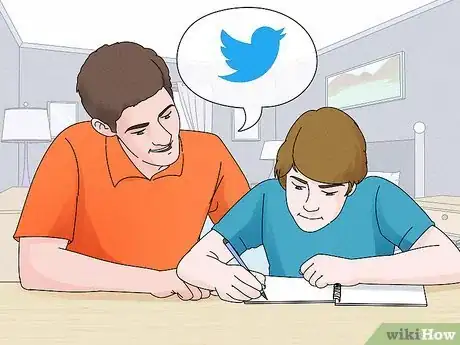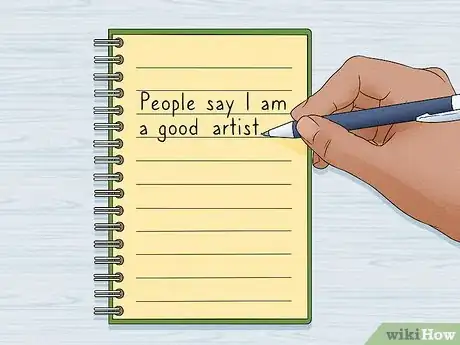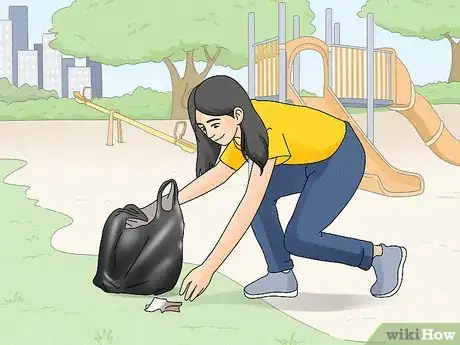This article was co-authored by Leah Morris and by wikiHow staff writer, Janice Tieperman. Leah Morris is a Life and Relationship Transition coach and the owner of Life Remade, a holistic personal coaching service. With over three years as a professional coach, she specializes in guiding people as they move through both short-term and long-term life transitions. Leah holds a BA in Organizational Communication from California State University, Chico and is a certified Transformational Life Coach through the Southwest Institute for Healing Arts.
There are 9 references cited in this article, which can be found at the bottom of the page.
This article has been viewed 22,845 times.
For teens, self-esteem and self-confidence can be really hard to come by. As a parent, teacher, or community leader, it can be challenging to bridge this gap and make a meaningful connection—but it’s definitely possible! We’ve put together some ideas and activities that can help teach teens confidence-building strategies. Scroll through this list and see if any of these options appeal to you.
Steps
Invite the teen to sketch a self-portrait.
-
A self-portrait is a great way to reflect and focus on the positives. Ask the teen to write “I am” above their picture, along with positive words that their friends and loved ones would use to describe them. Discuss these words and traits with the teen, so they can start to view themselves in a positive light.[1] X Research source
- Provide lots of art supplies for them to use so the teen can really unleash their creativity.
- This activity might appeal more to younger teens.
Encourage the teen to design a shoebox that mirrors their self-image.
-
Teens may learn a lot about themselves through this exercise. Provide an empty shoe box, along with lots of magazines, tape, markers, and other art supplies. Invite the teen to tape pictures, words, magazine clippings, and trinkets that represent how other people see them on the outside of the box. Then, ask them to add clippings, pictures, and words that represent their own self-image on the inside. Once the shoebox is done, discuss what they really like about themselves, as well as how they’d like to improve in the future.[2] X Research source
- This is an especially great activity for older teens.
Ask the teen to create a positive thinking journal.
-
Focusing on the positives may help boost self-esteem. Invite them to list positive traits about themselves, as well as specific instances that really demonstrate that nice quality. During the week, have them log some activities they did during the day, along with positive qualities they displayed during each activity.[3] X Research source
- For example, if a teen did their homework, they might write that they were “responsible” or “hard-working.”
Advise the teen to make a gratitude journal.
-
Research shows that practicing gratitude provides a self-esteem boost.[4] X Research source Invite the teen to jot down gratitude rituals they do already, like saying thanks before dinner. Then, ask them to write down things they’re thankful for, like electricity and food to eat, as well as people they’re thankful for, like friends and loved ones. Encourage them to write about past events that they now feel thankful for, along with specific moments when they feel grateful.[5] X Research source
- The teen could also write about ways they’ve thanked people in their life, or ways to plan on thanking people in the future.
Encourage the teen to reflect on self-esteem throughout the week.
-
A week-long exercise is a great way to build good self-esteem habits. At the beginning of the week, ask them to list some benefits of having high self-esteem. During the week, encourage them to think positive, encouraging thoughts. Invite them to write these thoughts on sticky notes and place them around their home. At the end of the week, ask the teen to reflect on their self-esteem, and how they feel after the week-long activity.[6] X Research source
- As an extra activity, you could ask them to write an essay about their experience, or to create a collage that represents high self-esteem.
Have the teen advise someone who’s struggling with their self-esteem.
-
Create an advice column-style worksheet with different “callers.” Ask the teen to write responses to these fake callers, where they offer their own advice on how to boost self-esteem. This is a great way to give them some perspective, and help them build their confidence and self-esteem.[7] X Research source
- You can find a free worksheet here: https://kidshealth.org/classroom/9to12/personal/growing/self_esteem_handout1.pdf
Invite the teen to boost a fictional character’s self-esteem.
-
Ask them to pick out a character from a film, TV show, or book. Discuss why this character has low self-esteem, and ask the teen to brainstorm a couple ways the character could boost their self-esteem. Then, talk about how the character’s life will be after they’ve improved their self-esteem.[8] X Research source
- For instance, a shy character from a school-themed TV show might boost their self-confidence by joining clubs and making new friends.
- A wizard character from a fantasy movie might boost their self-esteem by practicing their magic spells more often.
Help the teen focus on positive areas for change.
-
Ask them to reflect on different aspects of themselves. They might reflect on how they look physically, their personal body image, and how they use social media. For each individual aspect, ask them to write down 2 positive changes they can make for themselves. This is a great way to encourage positive thinking and build a healthy perspective.[9] X Research source
- For instance, a teen might write that they need to spend less time on Twitter, or that they should spend less time comparing themselves to other people on Instagram.
- Getting to really know yourself and understanding what you need to work on will help build confidence.
Ask the teen to write down their positive traits and qualities.
-
Develop a worksheet with different open-ended prompts. These prompts could be things like “I am unique because...” “I am proud of myself for...” “I feel good when I...” and “I have a natural talent for…” Ask them to fill in each prompt with lots of positive words and traits, so they can feel really good about themselves.[10] X Research source
- “Goals for my future are…” “People say I am a good…” and “The traits I admire myself for are…” are other excellent prompts.
- Positive affirmations like "I'm smart" or "I'm capable" are a great way to build self-esteem.
Promote exercise and physical activity.
-
Physical activity is a great way to boost self-esteem in teens. Research shows that teens feel better about themselves when they exercise, especially if they’re participating in a school activity or at a gymnasium. Invite the teen to sign up for a fun exercise program, like soccer, field hockey, dance, swimming, or strength training.[11] X Research source
- Any kind of exercise will do, whether it’s yoga, running, a team sport, or something else entirely.
- Self-love includes taking care of your body as well as your mind, heart, and soul.
Invite the teen to do some community service.
-
Volunteering is a great way to boost self-esteem. Look for community service opportunities in your area, like helping at a food pantry or coaching a sports team for little kids. Community involvement may help boost the teen’s self esteem, and teach them valuable lessons along the way.[12] X Research source
- They could help with a local clean-up, or join a youth radio station.
You Might Also Like
 How to Increase Your Self Confidence with Positive Daily Practices
How to Increase Your Self Confidence with Positive Daily Practices



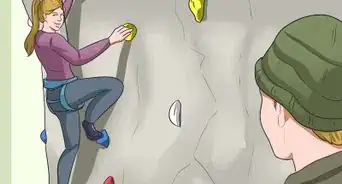


 How to Build Your Self Confidence
How to Build Your Self Confidence


 The Best & Easiest Ways to Overcome Your Shyness
The Best & Easiest Ways to Overcome Your Shyness



References
- ↑ https://www.cnybhcc.health/wp-content/uploads/2020/04/Telehealth-Activities-for-Youth-1.pdf
- ↑ https://www.cnybhcc.health/wp-content/uploads/2020/04/Telehealth-Activities-for-Youth-1.pdf
- ↑ https://www.cci.health.wa.gov.au/~/media/CCI/Consumer%20Modules/Improving%20Self-Esteem/Improving%20Self-Esteem%20-%2006%20-%20Accepting%20Yourself.pdf
- ↑ https://www.psychologytoday.com/us/blog/what-mentally-strong-people-dont-do/201504/7-scientifically-proven-benefits-gratitude
- ↑ https://kidshealth.org/en/teens/gratitude-worksheet.html
- ↑ https://classroom.kidshealth.org/classroom/9to12/personal/growing/self_esteem.pdf
- ↑ https://classroom.kidshealth.org/classroom/9to12/personal/growing/self_esteem.pdf
- ↑ https://classroom.kidshealth.org/classroom/6to8/personal/growing/selfesteem.pdf
- ↑ https://healthsmartva.pwnet.org/uploads/rteditor/file/gr10-se-9-building-self-esteem-image.pdf
About This Article

